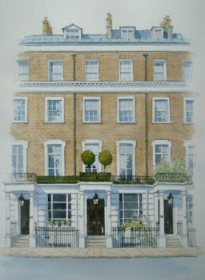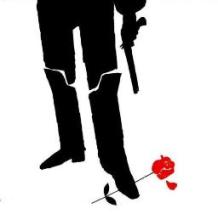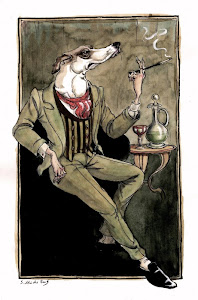 "A fogey is a culturally conservative young person, prematurely young you might say, who adopts the clothing, style, and mannerisms of a bygone age. The key reference here is Evelyn Waugh's Brideshead Revisited, a public school and Oxbridge world inhabited by tweed wearing, reserved (if not repressed) and wilfully eccentric young men. Adopting these mannerisms is a mark of the fogey's cultural distinctiveness and sets them apart from the trends that tend more normally to mark the life of the young. The idea of the fogey is a uesful way of thinking about Tory anarchists of all stripes as it encapsulates the nostalgic utopianism for the past that they convey in aspects of their work and in their critiques of contemporary mores. Whilst is it often a term associated with figures attached to the Daily Telegraph newspaper, it is just as useful as an insight into the world of the Tory anarchist. The term 'fogey' is an old British phrase that dates back several hundred years and refers to 'old-fashioned' people. The term 'young fogey', by contrast, was first put forward by the journalist Alan Watkins in the Spectator magazine in 1984 when he said of them:
"A fogey is a culturally conservative young person, prematurely young you might say, who adopts the clothing, style, and mannerisms of a bygone age. The key reference here is Evelyn Waugh's Brideshead Revisited, a public school and Oxbridge world inhabited by tweed wearing, reserved (if not repressed) and wilfully eccentric young men. Adopting these mannerisms is a mark of the fogey's cultural distinctiveness and sets them apart from the trends that tend more normally to mark the life of the young. The idea of the fogey is a uesful way of thinking about Tory anarchists of all stripes as it encapsulates the nostalgic utopianism for the past that they convey in aspects of their work and in their critiques of contemporary mores. Whilst is it often a term associated with figures attached to the Daily Telegraph newspaper, it is just as useful as an insight into the world of the Tory anarchist. The term 'fogey' is an old British phrase that dates back several hundred years and refers to 'old-fashioned' people. The term 'young fogey', by contrast, was first put forward by the journalist Alan Watkins in the Spectator magazine in 1984 when he said of them:[The young fogey] is libertarian but not liberal. He is conservative but has no time for Mrs Margaret Thatcher and considers Mr Neil Kinnock the most personally attractive of the present party leaders. He is a scholar of Evelyn Waugh. He tends to be coolly religious, either R.C. or C of E. He dislikes modern architecture. He makes a great fuss about the old Prayer Book, grammar, syntax, and punctuation. He laments the difficulty of purchasing good bread, Cheddar cheese, kippers and sausages...He enjoys walking and travelling by train. He thinks The Times is not what it was and prefers The Daily Telegraph.
From this description it is possible to see that there are a number of young fogeys across the contemporary British cultural scene, but that not all of them are Tory anarchists in outlook. The young fogey movement of the 1980s was seen as a reaction to the materialism and un-conservative outlook of the then Thatcher Governments whose vulgar materialism seemed to value little that would be of importance to traditional conservatives. Whilst this movement has largely disappeared, both celebrated and sent up in the magazine the Chap, the conditions that generated it and which have produced Tory anarchism in British culture remain. Tory anarchists are fogeys of a particular kind, however, often imbued with a sense of irony about their appearance (Waugh and Cook). They are prone to adopting a tone that is at once puritanical in its moral condemnation of the weaknesses, vices and follies of others, and at the same time likely to treat serious matters with frivolity, recognising always that life is fundamentally an absurd adventure in which human nature is most likely to condemn us to make fools and hypocrites of ourselves. Thus the impact of Tory anarchists on popular culture has been to play the role of the antagonistic outsider, pushing the boundaries of taste and excess to their often-illogical extremes whilst inviting us to laugh at our own moral failings. The puritanical fogey aspect of Tory anarchists gives their work a religious tone, as though their comments, asides, and quips were being delivered by a priest who wants both to mock and condemn his congregation."
The Strange Case of Tory Anarchism, Peter Wilkin (2010)





















1 comment:
I've just received my copy and so far it doesn't disappoint. It's a welcome prescriptive for life among the "elite anti-elites". Three cheers to fighting the 'Class Waugh'!
Post a Comment